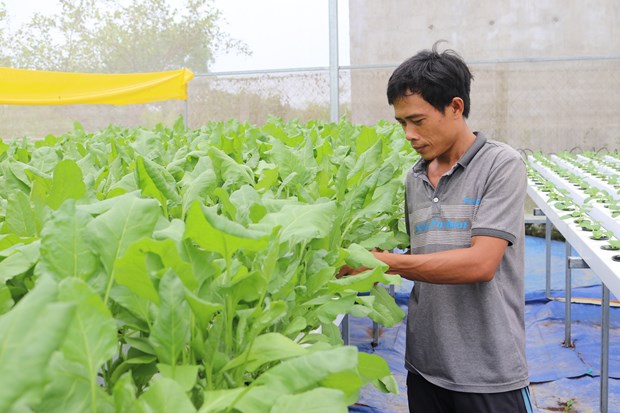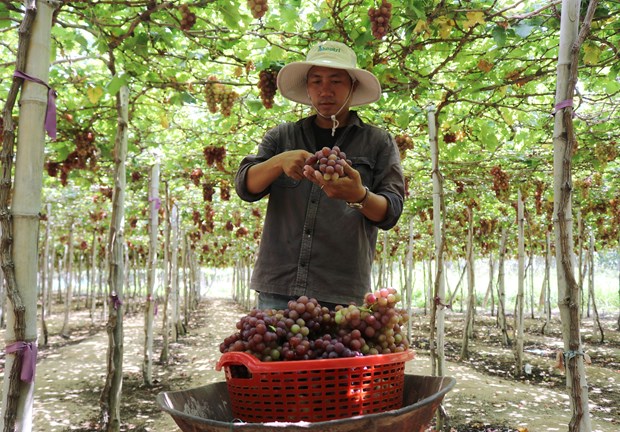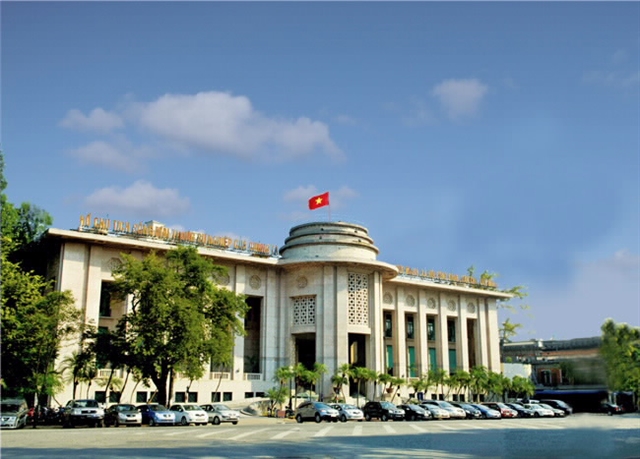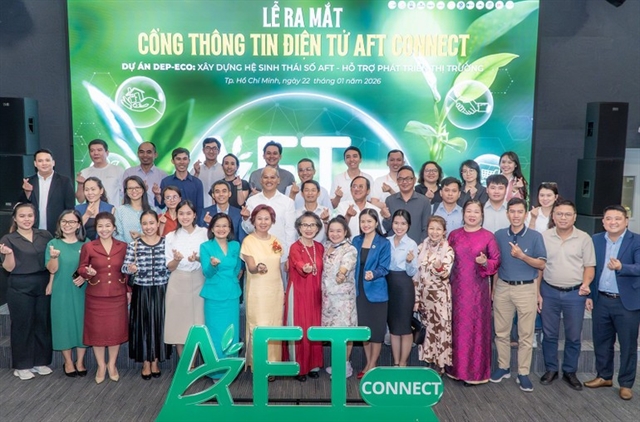 Society
Society

 |
| Nguyễn Minh Phi with the hydroponic vegetable farming model at his greenhouse. — VNA/VNS Photo |
NINH THUẬN — The application of science and technology in agricultural production to enhance economic efficiency and increase competitiveness has been strongly promoted in the south-central Ninh Thuận Province in recent years.
Nguyễn Minh Phi, a farmer from Phước Dân Town, Ninh Phước District, said using traditional methods in agricultural production has not brought high economic efficiency.
In 2022, after visiting hydroponic vegetable farming models in HCM City and other provinces, Phi decided to invest over VNĐ700 million (US$29,920) in building a greenhouse to grow vegetables in the direction of clean agriculture.
Phi said growing green vegetables using the hydroponics has helped farmers to eliminate harmful substances for plants.
It gets rid of the need for various soil-related tasks such as soil preparation, weeding, tilling, and watering, which helps save costs. Additionally, hydroponic vegetables are produced in a closed environment, avoiding influences from the external environment and insects.
The hydroponic rack is placed about one metre above the ground, minimising the risk of fungal and diseases. As a result, there is no need for chemicals, he said.
Phi's hydroponic vegetable garden covers an area of 500sq.m where he cultivates Chinese cabbage, lettuce, spinach, broccoli, ensuring a continuous and timely supply to the market. Every day, he harvests and sells 30-40kg of various vegetables, with prices ranging from VNĐ30,000 to 45,000 per kilogramme.
On average, he earns about VNĐ10 million per month.
Despite the small cultivation area, the economic benefits are good. His hydroponic farming model in the greenhouse is becoming a place for local farmers to learn techniques to apply in their own production.
Prioritising investment in technology and techniques to improve production efficiency in association with the development of agro-ecological tourism in order to bring dual benefits is the direction being applied by many farmers and agricultural cooperatives in Ninh Thuận Province.
 |
| A farmer harvests grapes with VietGAP standard in Thái An grape village in Ninh Hải District's Vĩnh Hải Commune. — VNA/VNS Photo |
Nguyễn Khắc Phòng, director of the Thái An Agricultural Services Cooperative in Vĩnh Hải Commune, Ninh Hải District, said that by applying advanced techniques into the production of new grape varieties, each hectare of grapes produces an income ranging from VNĐ500 million to 600 million per crop, resulting in an annual income of approximately VNĐ1 billion to 1.2 billion per hectare.
The grape gardens of the Thái An cooperative's members have become a popular destination for tourists. Visitors can enjoy fresh grapes for free, buy grapes and related products.
According to the provincial Department of Agriculture and Rural Development, the province has supported production facilities and cooperatives in applying science and technology to production, aiming to create breakthroughs in productivity and quality, and promote sustainable agriculture.
Ninh Thuận is now home to 260ha of high-tech farming land and the area is expected to reach 1,000ha by 2025.
The locality has attracted 31 high-tech agricultural projects so far, all of which have been operational.
The application of scientific and technological advances in agricultural production has led to the development of many production models that bring significant economic benefits and are being replicated in various localities.
These models include the use of insect-proof nets for apple and grape orchards, high-tech Japanese-style melon cultivation, greenhouse grape cultivation, hydroponic vegetable farming, and VietGAP-standard apples. These models have contributed to positive changes in the mindset of farmers, enabling them to adapt to climate change and expand their product consumption markets.
Vice chairman of the provincial People's Committee, Lê Huyền, said the locality is actively restructuring the agricultural sector, with a focus on developing high-tech agriculture linked to the digital economy and digital transformation in a modern direction. This is seen as a breakthrough solution to promote agricultural production and improve the livelihoods.
The province expects to obtain a growth rate of 4-5 per cent per year in agricultural production value in 2023, in which the value of hi-tech farming increases by 30-40 per cent.
It also aims to increase the total area of high-tech agricultural production to 500ha, with a production value of VNĐ700 million per hectare.
Ninh Thuận will prioritise attracting businesses from outside the province to participate in high-tech agricultural production, he said.
The province will earmark nearly VNĐ7 billion to support 10 high-tech agricultural projects, while enhancing cooperation with centres, research institutes and organisations in and outside the province in selecting production technologies, and plant varieties and animal breeds for production.
The province will creates favourable conditions for investors and businesses to learn about mechanisms, policies, procedures, market potential, partners, and investment opportunities. It will organise promotional seminars and calls for high-tech companies and scientific and technological enterprises to invest in the agricultural sector.
Agricultural credit policies to support investment in agricultural production will also be implemented, Huyền added.
It will focus on developing a skilled workforce to serve high-tech agricultural production. The establishment of value chain linkages, trade facilitation, and expansion of the market for agricultural products will be promoted.
Allocation of resources to expedite digital transformation in the agricultural sector will be also prioritised, aiming to turn high-tech agriculture into a key driver of economic development. — VNS




